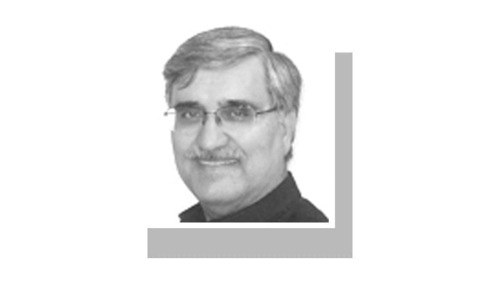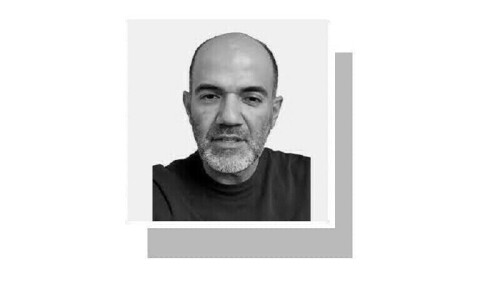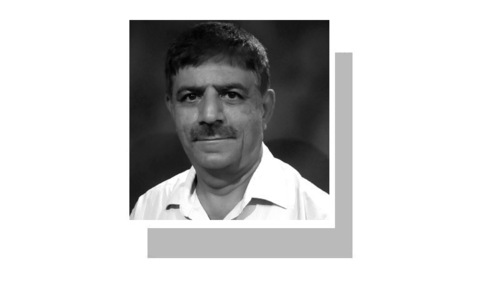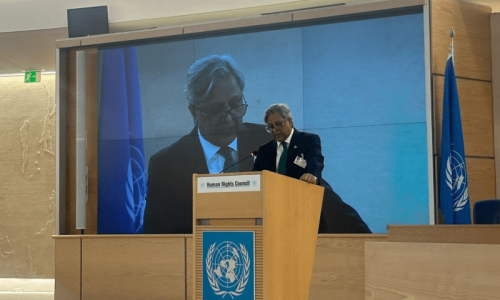WITH the Tehreek-i-Taliban Pakistan back in the killing business with renewed ferocity, it is time we took a look at its ideological moorings. In a nutshell, like the communist parties of yore, the TTP’s aim is the destruction of the existing order (run by infidels, as defined by it) — an idea instilled into the TTP brains by mentors opposed to the very concept of a nation state.
Osama bin Laden never headed the TTP formally. He couldn’t, because the name Pakistan was there. But the Al Qaeda chief and the man who succeeded him, Ayman al-Zawahiri, had a lasting impression on TTP philosophy.
Both were indifferent to the interests of non-Arab states, regarded such Muslim countries as Iran and Turkey their enemies, and never cared about Central Asian states, except as a recruitment ground.
While opposition to the nation state idea doesn’t necessarily zoom in on Pakistan, the tragedy was that both OBL and al-Zawahiri had little love for Pakistan even though this country was their operational base. This selfishness betrayed a harsh reality: their political philosophy evolved in statelessness.
OBL was a pariah in Saudi Arabia, and al-Zawahiri an Egyptian fugitive who faced execution in his country. Both chose to work in Pakistan because of the respect they enjoyed from the people simply because they were Arab. Their base was the Af-Pak region, and they didn’t know and didn’t care to know what and where the Durand Line was.
They moved freely on both sides and found the 2,400-kilometre long mountainous sanctuary and the tribal people’s hospitality ideal for pursuing their international ‘Islamic’ agenda, though this ‘Islamic’ fervour had an Arab bias. More regretfully, al-Zawahiri had an anti-Pakistan tilt from the very beginning, and OBL did nothing to discourage it.
OBL and al-Zawahiri had a lasting impression on TTP philosophy.
OBL’s own speeches on Pakistani soil reflected a worldview that didn’t take into consideration Pakistan’s concerns. In many speeches, he spoke passionately about Palestine and talked also about Chechnya and the Rohingya, but hardly made any reference to Kashmir. I would be happy if some reader were to correct me.
Al-Zawahiri, on the contrary, actively pursued his anti-Pakistan agenda. His specialty was organising anti-government coups, working on potential collaborators in the armed forces of Egypt and other Arab countries, and having several nationalities. On one of his fake passports, he even visited the US on a fund-raising campaign.
In Pakistan, his most criminal act was the bombing of the Egyptian embassy in 1995, even though Osama didn’t believe Al Qaeda should annoy Pakistan.
Al-Zawahiri was also involved in the Lal Masjid uprising in Islamabad, and was in contact with Abdul Rashid and Abdul Aziz, the men who had turned the mosque into an arsenal and brainwashed and trained ‘commandos’ who often raided Islamabad’s shops and confiscated ‘obscene’ magazines.
It is also alleged al-Zawahiri had a role in Benazir Bhutto’s assassination. He became Al Qaeda chief after Osama bin Laden was killed in an American raid.
In his monumental book, Descent into Chaos, Ahmed Rashid gives a chilling account of Afghan Taliban’s inroads into Pakistan when Hamid Karzai was the ruler, and says things which Pakistan must know could be replicated if the now defunct Fata were to be handed over to the TTP.
Afghan Taliban and fighters from other Muslim countries, writes Rashid, “worked in Pakistan’s Fata region, helping train a new generation of Taliban and Pakistani extremists in the arts of bomb-making and fund-raising. […] In 2007 many of these militants were to fight alongside the Pakistani Taliban as they extended their writ across the North-West Frontier Province”.
With Al Qaeda’s help, the Taliban established a “lethal cottage industry”, manufacturing improvised explosive devices in tribal households. Soon, says Rashid, “the Taliban would be using the same IEDs against Pakistani forces”.
More gruesome, by 2006, they had executed 120 tribal leaders who had disagreed with them; by 2008 more than 4,000 Uzbek fighters were active in what then was Fata and were pushing for the Talibanisation of the entire NWFP.
The renewal of TTP activity is marked by brutality, as seen by the recent beheading of two people for their purported spying for the security forces. Clearly, the most unfortunate phenomenon at present is the mysterious if not duplicitous behaviour of the Kabul regime.
Ignoring the recent exchange of artillery fire across the border, the Kabul regime has not come clean on its policy towards terrorist groups operating from its soil. In fact, it is obvious that the TTP’s logistics base in the former Fata cannot sustain its current level of militancy and that it has no choice but to have safe havens in Afghanistan.
Pakistan’s greatest asset is the tribal people’s abhorrence of TTP killers. Islamabad thus has to build on the people’s sentiments rather than expect meaningful cooperation from the ungrateful Kabul regime.
The writer is Dawn’s External Ombudsman and an author.
Published in Dawn, December 29th, 2022












































